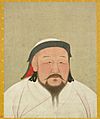1279 facts for kids
The year 1279 was a time of important changes and events across Europe and Asia. Kings made new laws, battles were fought, and old knowledge was translated into new languages. It was a year that helped shape the future in many ways.
Important Events of 1279
- On March 5, a big battle happened! Lithuanian forces, led by their leader Traidenis, won a victory against the Teutonic Knights in the Battle of Aizkraukle. The Teutonic Knights were a powerful group of warrior monks from Germany. This win was a big deal for Lithuania.
- King Edward I of England introduced new laws called the Statutes of Mortmain. These laws were made to stop too much land from being given to the church. The king wanted to make sure that land stayed under his control and could be taxed.
- A major survey of England, called the Hundred Rolls, began in 1279 and lasted until 1280. This was like a big census (a count of people and things) that followed up on an even older survey called the Domesday Book from 1086. It helped the king understand what was in his kingdom.
- Important medical writings by a famous doctor named Al-Razi were translated into Latin in 1279. This was done by Faraj ben Salim, about 350 years after Al-Razi had lived. This translation helped spread medical knowledge across Europe.
- The place where England made its money, called the Royal Mint, moved to the Tower of London. This was a very secure place to make coins.
- The town of Haapsalu in Estonia was officially founded.
Images for kids
-
The Mongol invasion of the Song Dynasty in China (1234–79)
-
A portrait of Kublai Khan (1215–1294), a powerful Mongol leader
| Millennium: | 2nd millennium |
|---|---|
| Centuries: | 12th century – 13th century – 14th century |
| Decades: | 1240s 1250s 1260s – 1270s – 1280s 1290s 1300s |
| Years: | 1276 1277 1278 – 1279 – 1280 1281 1282 |
See also
 In Spanish: 1279 para niños
In Spanish: 1279 para niños

All content from Kiddle encyclopedia articles (including the article images and facts) can be freely used under Attribution-ShareAlike license, unless stated otherwise. Cite this article:
1279 Facts for Kids. Kiddle Encyclopedia.


